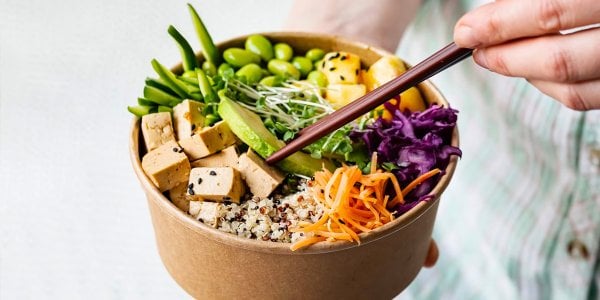This simple supermarket switch-up could drastically cut down your shopping bill
By
VanessaC
- Replies 22
The cost of living crisis has forced us to be smarter and more mindful when it comes to our financial decisions.
And with the continuous rise of the cost of living, it pays to shop smarter—and a simple switch in the meat aisle could make all the difference.
The experts at Finder say we should be cutting down on the amount of meat we purchase, and Angus Kidman, a Money Expert at Finder, believes it's actually a lot easier than many think.
'If you think of meat as the protein component of a meal—which is essentially what it is—you can definitely do that much, much cheaper with the right mix of vegetables,' Mr Kidman said.
'You're talking a savings of 10 times or more in the price of some of those things. So having that flexible attitude does help a lot to save money.'
Mr Kidman said meat prices have 'absolutely' increased by a 'huge amount' in Australia, and unfortunately, these increases are expected to take hold for the new future.
'It doesn't seem likely that we're going to see any major drops there for a while, because there's still no clear indication in supply chain terms that there's going to be much of a decline,' he said.
'We may not see the same rises as we've seen in the last year, but it's unlikely that we're going to see huge bargains happening within the meat industry either.'
But the good news is, it's never been a better time to be a vegan or vegetarian. While for some, these diets may seem restrictive and incompatible with their lifestyle, it's important to note that right now, fruit and vegetables are actually cheap.
The Australian Bureau of Statistics (ABS) recently reported that in the 12 months to July, fruit and vegetable prices recorded a downward movement of 5.4 per cent.
'Clearly, people are looking towards some of those cheaper alternatives,' Mr Kidman said.
'Especially because it's very hard to imagine a scenario in which meat ends up being cheaper than the alternatives because there's fundamentally a difference in the cost of production. And that's never really going to change.'
Globally, 57 per cent of the greenhouse gas emissions of the entire food production industry is due to meat consumption. Consuming meat also has other effects, like mass deforestation and the loss of biodiversity. Given the grave implications, reducing meat intake is surely worth considering.
That said, barring dietary considerations and conscious choices, cutting out meat completely isn't necessary. You can still eat it—just not as much as you are used to.
According to Aussie dietary guidelines, it's recommended an adult eats no more than 455 grams of cooked red meat per week, or less than 65g a day. This would be roughly equivalent to one lamb chop.
So, where do we start?
Well, Mr Kidman recommends being smart when looking for vegetarian meal alternatives—it's important to note that meat-free protein substitutes, such as soy or tofu products, are fine, but they're not necessarily healthier or cheaper.
'If you go for the vegan meat alternatives, Beyond Burgers, things like that, those are just as expensive as meat, if not more so. So for going vegetarian or vegan to work as a budget, you have to be smart,' he said.
He also encouraged people to research vegetarian meal options before grocery shopping to see which items on the list could be swapped out.
Aussies are also sharing how they’ve managed to save some dollars by reducing their meat intake, with one saying: 'I mean a pack of lentils cost $1, quinoa $3-4, chickpeas $1, veggies and fruits are usually on the cheaper side.'
'Vegan staples are usually in general cheap. Beans, veggies, seeds, grains, fruits, etc. Depending on where you live, being vegan can be cheaper for you, especially if you buy in bulk!’
‘Eating processed vegan products is what really runs your grocery bill up. Whole food plant-based eating will save your pockets,' the shopper added.
'93 grams of protein for $2.30 and they say being vegan is expensive. Lots of goodness and no cholesterol,' another shared about a bag of Woolworths Peanuts Unsalted.
Another shopper shared how they were able to buy an entire box of fresh produce for only $6 by shopping at their local grocer.
'Bought a box for $6 containing everything you see in the picture. Couldn’t pick and choose what I bought and wasn’t able to even see everything I was buying but I think it was worth it,' the shopper said.
Furthermore, a recent US study conducted by the Physicians Committee for Responsible Medicine (PCRM) found that cutting out dairy and meat can lead to significant savings. According to the research, those who stuck to their regular diet did not save any money, while food costs dropped by 16 per cent for participants who switched to a vegan diet.
 So, members, do you have tips or stories to share about how you’ve saved money by reducing your meat intake? If not, would you consider trying it out, if only to save? Let us know in the comments below
So, members, do you have tips or stories to share about how you’ve saved money by reducing your meat intake? If not, would you consider trying it out, if only to save? Let us know in the comments below
And with the continuous rise of the cost of living, it pays to shop smarter—and a simple switch in the meat aisle could make all the difference.
The experts at Finder say we should be cutting down on the amount of meat we purchase, and Angus Kidman, a Money Expert at Finder, believes it's actually a lot easier than many think.
'If you think of meat as the protein component of a meal—which is essentially what it is—you can definitely do that much, much cheaper with the right mix of vegetables,' Mr Kidman said.
'You're talking a savings of 10 times or more in the price of some of those things. So having that flexible attitude does help a lot to save money.'
Mr Kidman said meat prices have 'absolutely' increased by a 'huge amount' in Australia, and unfortunately, these increases are expected to take hold for the new future.
'It doesn't seem likely that we're going to see any major drops there for a while, because there's still no clear indication in supply chain terms that there's going to be much of a decline,' he said.
'We may not see the same rises as we've seen in the last year, but it's unlikely that we're going to see huge bargains happening within the meat industry either.'
But the good news is, it's never been a better time to be a vegan or vegetarian. While for some, these diets may seem restrictive and incompatible with their lifestyle, it's important to note that right now, fruit and vegetables are actually cheap.
The Australian Bureau of Statistics (ABS) recently reported that in the 12 months to July, fruit and vegetable prices recorded a downward movement of 5.4 per cent.
'Clearly, people are looking towards some of those cheaper alternatives,' Mr Kidman said.
'Especially because it's very hard to imagine a scenario in which meat ends up being cheaper than the alternatives because there's fundamentally a difference in the cost of production. And that's never really going to change.'
Globally, 57 per cent of the greenhouse gas emissions of the entire food production industry is due to meat consumption. Consuming meat also has other effects, like mass deforestation and the loss of biodiversity. Given the grave implications, reducing meat intake is surely worth considering.
That said, barring dietary considerations and conscious choices, cutting out meat completely isn't necessary. You can still eat it—just not as much as you are used to.
According to Aussie dietary guidelines, it's recommended an adult eats no more than 455 grams of cooked red meat per week, or less than 65g a day. This would be roughly equivalent to one lamb chop.
So, where do we start?
Well, Mr Kidman recommends being smart when looking for vegetarian meal alternatives—it's important to note that meat-free protein substitutes, such as soy or tofu products, are fine, but they're not necessarily healthier or cheaper.
'If you go for the vegan meat alternatives, Beyond Burgers, things like that, those are just as expensive as meat, if not more so. So for going vegetarian or vegan to work as a budget, you have to be smart,' he said.
He also encouraged people to research vegetarian meal options before grocery shopping to see which items on the list could be swapped out.
Aussies are also sharing how they’ve managed to save some dollars by reducing their meat intake, with one saying: 'I mean a pack of lentils cost $1, quinoa $3-4, chickpeas $1, veggies and fruits are usually on the cheaper side.'
'Vegan staples are usually in general cheap. Beans, veggies, seeds, grains, fruits, etc. Depending on where you live, being vegan can be cheaper for you, especially if you buy in bulk!’
‘Eating processed vegan products is what really runs your grocery bill up. Whole food plant-based eating will save your pockets,' the shopper added.
'93 grams of protein for $2.30 and they say being vegan is expensive. Lots of goodness and no cholesterol,' another shared about a bag of Woolworths Peanuts Unsalted.
Another shopper shared how they were able to buy an entire box of fresh produce for only $6 by shopping at their local grocer.
'Bought a box for $6 containing everything you see in the picture. Couldn’t pick and choose what I bought and wasn’t able to even see everything I was buying but I think it was worth it,' the shopper said.
Furthermore, a recent US study conducted by the Physicians Committee for Responsible Medicine (PCRM) found that cutting out dairy and meat can lead to significant savings. According to the research, those who stuck to their regular diet did not save any money, while food costs dropped by 16 per cent for participants who switched to a vegan diet.
Key Takeaways
- According to Angus Kidman, a Money Expert at Finder, cutting out meat could result in drastic savings.
- Mr Kidman explains that meat prices have increased significantly in Australia and it seems unlikely that this trend will reverse anytime soon.
- The Australian Bureau of Statistics (ABS) reports that the prices of fruits and veggies have declined by 5.4 per cent in the 12 months to July.
- A study conducted by the Physicians Committee for Responsible Medicine (PCRM) in the US finds that switching to a vegan diet can lead to a 16 per cent reduction in food costs.








